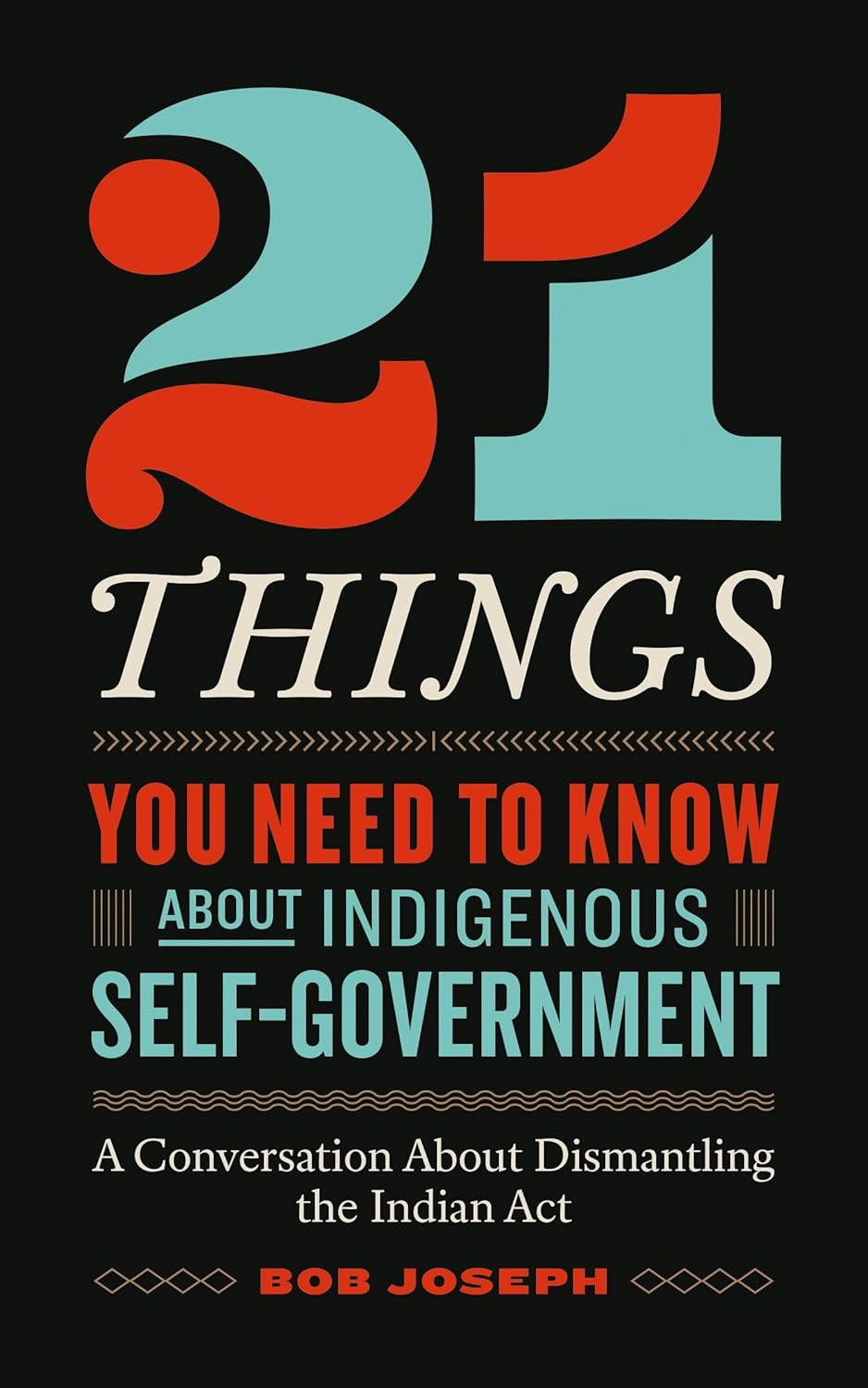21 Things You Need to Know About Indigenous Self-government by Bob Joseph
Reviewed by Dawn Macdonald
Bob Joseph has a rare talent for explaining complicated things without losing the thread. For Indigenous Nations in what is now called Canada, it’s rather a twisty road back to self-government. I say “back” because, of course, all Indigenous Peoples were originally self-governing. In a modern context, we’re talking about a negotiated dismantling of the Indian Act, which has served as an instrument of control since 1876. Crucially, self-government in no way obviates fiduciary and other duties that Canada has assumed towards Indigenous Peoples, which are rooted in historical obligations. The process and outcomes look different from one Nation to the next, but all return control of Indigenous Nations’ affairs to their own communities, to be defined as they see fit, within the framing provided by federal and provincial law.
If all of this sounds dry and legalistic, well, it is somewhat, and that’s why it’s so helpful to have a guide like Joseph. His list of “21 Things,” conveniently adumbrated in the Table of Contents, takes us from the international framework of the United Nations Declaration of the Rights of Indigenous Peoples through to the ways in which municipalities and regional authorities can support self-government, with an overall message that self-government is achievable and desirable. His style is breezy, making it actually fun to learn about what seems to be quite a heavy topic. He has a story about being denied a loan for a vehicle because of wrinkles in how the Indian Act handles property on reserve; he explains the power held by Aunties whose advice is sought by titular leaders in the community. He’s unsparing in laying out the realities on the ground. Talking about the assimilationist aims of the Indian Act, he states, “It was assumed that the assimilation process would be speedy, that Indigenous Peoples would embrace the opportunity to exchange their traditions and cultures for those of the European settlers, and it would work out. But that is not what happened.”
“Both of Joseph’s 21 Things books belong on the shelves of all Canadians who care about how we live together as peoples within the boundaries of a nation state.”
The Indian Act, he explains, created a “trustee-ward” relationship where individual band members had the status of “wards of the Crown” until such time as they “successfully” assimilated into mainstream Canadian society. Various provisions were framed as forms of “help” given to Indigenous Peoples with this end goal in mind. However, the Act “separated Indigenous Peoples and kept them living on separate lands and under separate laws. This is the great paradox of the Indian Act.”
Clearly, an understanding of the Indian Act is integral to a grasp of contemporary self-government. 21 Things You Need to Know About Indigenous Self-government serves as a companion volume to Joseph’s earlier 21 Things You May Not Know About the Indian Act (Indigenous Relations Press, 2018). That previous book outlines the many ways in which the Act has operated to exert control and create dependency.
Currently, 43 Indigenous nations are covered by 25 negotiated self-government agreements, with another 50 or so in progress. Eleven of these existing agreements are in operation in my home territory of the Yukon, and as a non-Indigenous resident who grew up during the time of negotiations, I can speak to the positive change this represents for all Yukoners. Not that racism has gone away, nor the stark disparities in health and wealth that are rooted in long-term harms of colonization, but our governments and organizations now approach one another in an attitude of relationality. Consultation is meaningful, and even as we continue to experience struggles and missteps, we can at least stumble along a path for living alongside one another on these shared lands.
Both of Joseph’s 21 Things books belong on the shelves of all Canadians who care about how we live together as peoples within the boundaries of a nation state. A resilient future of mutually strengthening relationship is in sight. The details can feel overwhelming, but with guidance from wise and good-humoured experts like Joseph, we are each empowered to play our part.
About the Author
Bob Joseph, president of Indigenous Corporate Training Inc., has provided training on Indigenous relations since 1994. He has a diverse range of clients, including all levels of government, Fortune 500 companies, resource development companies, and small and medium-sized businesses. He is also the author of the national bestseller 21 Things You May Not Know About the Indian Act.
About the Reviewer
Dawn Macdonald lives in Whitehorse, Yukon, where she grew up without electricity or running water. She won the 2025 Canadian First Book Prize for her poetry collection Northerny. She posts weekly at Reviews of Books I Got for Free or Cheap (on Substack), as well as reviewing for journals and for The Seaboard Review of Books.
Book Details
Publisher : Page Two
Publication date : Sept. 2 2025
Language : English
Print length : 216 pages
ISBN-10 : 1774586274
ISBN-13 : 978-1774586273





